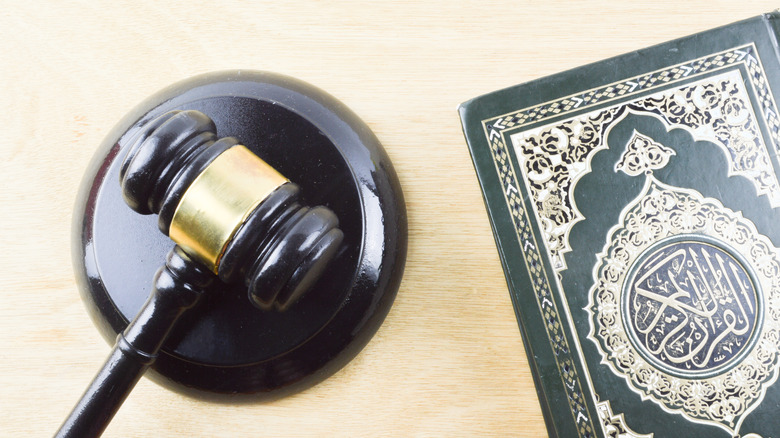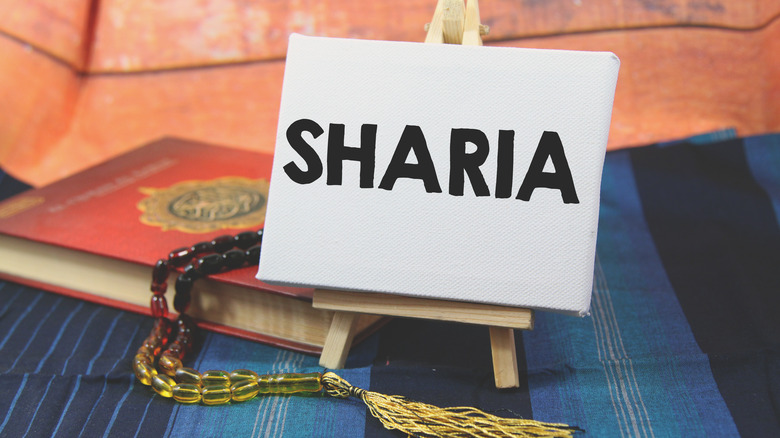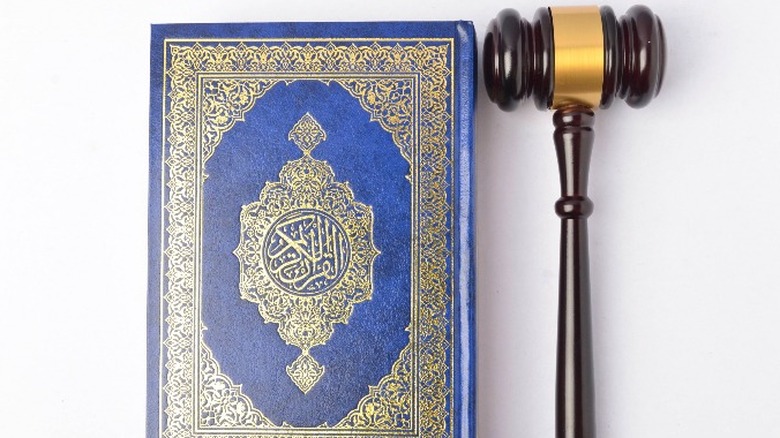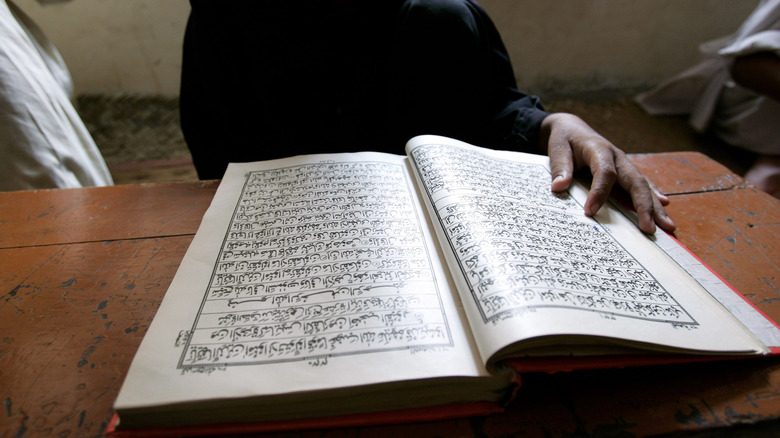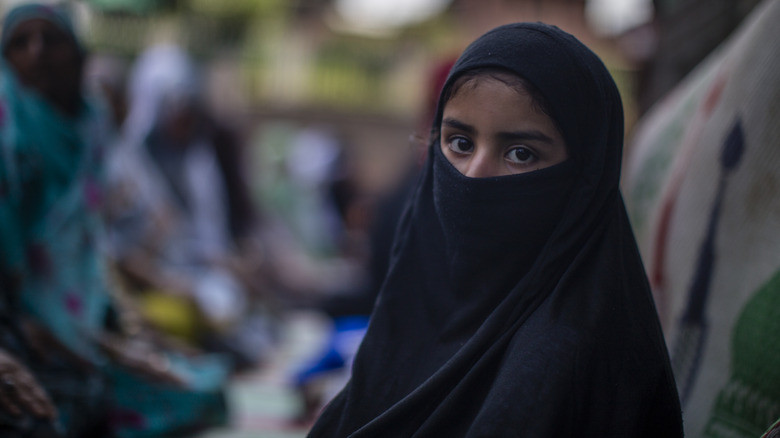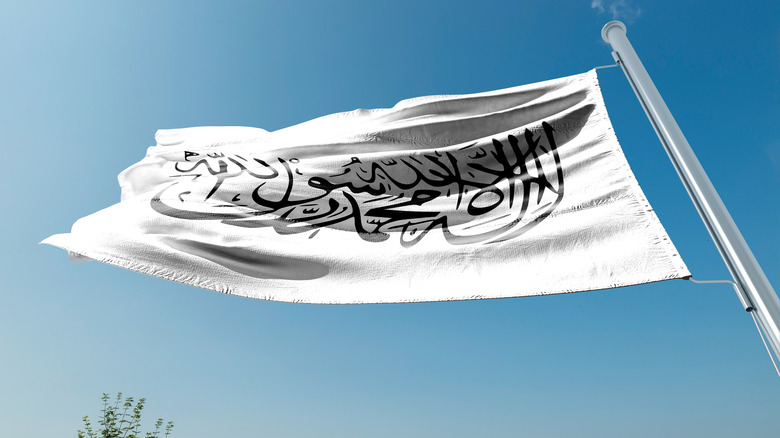The Untold Truth Of Sharia Law
Sharia law has come into the spotlight after the Taliban took control over Afghanistan in August 2021. The group stands by its interpretation of Sharia law and has announced that it will continue to follow its guidelines in the future. Per the BBC, Zabihullah Mujahid, a spokesperson for the Taliban, said that all Afghani citizens will be required to stay "within the framework of Islam." He further added that women in Afghanistan will be permitted to work and will get access to the education system.
However, it's not yet clear as to what the Taliban's next steps will be. It's notorious for following a strict and rigid version of Sharia law, something that was a cause for concern for the public when they ruled Afghanistan in the late 1990s.
Per The Conversation, Sharia essentially guides all Muslims and teaches them the best practices that they need to follow to live an "ethical" life. However, it is true that there are several myths that plague Sharia law, and not many people are aware of what it actually entails. This is partly due to extremist groups such as the Taliban and their harsh outlook. Here's a brief glimpse into what Sharia law is really about and how it is practiced around the world.
Sharia law is a disputed topic
The thing with Sharia law is that nothing is straightforward at all. It's a matter of conflict for many who don't see eye to eye as far as Sharia is concerned. According to a survey conducted by the Pew Research Center, Muslims are divided over the law and have different opinions. While some believe that it should be adopted in their country as "the official law of the land," others beg to differ.
In Afghanistan, 99% of Muslims support Sharia law. Other large majorities include Iraq (91%) and Pakistan (84%). Other places aren't interested in seeing the law become official in their countries, such as Turkey (12%), Kazakhstan (10%), and Azerbaijan (8%).
Consider this example as well: In 2018, Greece decided to allow Muslim citizens to seek justice in cases of family dispute at a court of law instead of being forced to follow Sharia law (via The Guardian.) "There is no doubt this is an important step and a positive one that will open the way to further freedom for our community," Mustafa Mustafa, a member of Parliament, said in a statement. He added that he wished to see Sharia courts being completely abolished.
It's not actually a law
Even though it's known as Sharia law, it's important to clarify that it isn't actually a law at all and refers to a basic set of guidelines that all Muslims are encouraged to follow in their everyday lives. According to The Conversation, Sharia technically means "the way" in Arabic, with principles derived from the teachings from Muhammad and the Quran. Itd
shouldn't be perceived as a narrow set of rules or something that's highly restrictive.
Another crucial point worth remembering is that Sharia is not fixed and is actually evolving with time. As per Bloomberg, this has been the case for many centuries and isn't anything new. A UNESCO piece supports this point and says that a fixed image of Sharia only seeks to aid those in power and is far from the actual truth. The piece also quotes a professor from Columbia University, Wael Hallaq, who said that at its core, sharia "was as much a way of living and of seeing the world as it was a body of belief."
It has a set of guidelines for practitioners
Per UNESCO, sharia law is a "spiritual guide" that doesn't include legal guidelines as such. But practicing Muslims can turn to Sharia law if they need help and guidance. According to the Council on Foreign Relations, Sharia is vast and covers nearly everything you can think of such as everyday life, family disputes, divorce, religious practices, crime, marriage, and more.
Sharia law classifies various crimes differently based on the severity. The Quran notes that there are hadd punishments that require a judge to make a ruling, and there are those transgressions that can be handled differently. For example, a murdered person's family may receive blood money in exchange for forgiveness. The hadd crimes include adultery, consuming alcohol, theft, and more. These crimes can be punished severely, but that's not always the case and depends on the local government.
The law also has other controversial aspects to it such as polygamy, child marriages, and strict inheritance rules, among others. Gender equality is another topic that is relevant in terms of Sharia: Women are often believed to have less control over their lives compared to their male counterparts.
Scholars have been crucial in interpreting Sharia law
Sharia seeks inspiration from sacred books such as the Quran. According to UNESCO, most experts believe that there is no way to find the complete contents related to Sharia law because it's not available in any of the sacred texts in its entirety and is subjective in some ways. An Egyptian theologian, Ali Abderrazik, said that Sharia law is simply a guide that allows people to come up with a system of their own.
As explained by Bloomberg, this law is dependent on Islamic scholars, clerics, and even politicians. Of course, Muslims also turn to Prophet Muhammad's teachings in a bid to understand how they can abide by the law. Additionally, the legal policies that are connected to Sharia law may be known as Islamic law or fiqh in Arabic (via The Conversation). Again, scholars play a crucial role in this process and can help others interpret Sharia. Interestingly, many experts state that in the context of Sharia law, it's important to look after "life, intellect, family, property, and the honor of human beings." This is, of course, something that has been difficult to implement in reality.
Sharia law can be misinterpreted
Because there is no one specific source to refer to, it's plausible that someone may misinterpret the law or change some of its guidelines as per their beliefs. Here is an example: In 2018, a Reuters report stated that many experts reckon that misinterpreting Sharia law is particularly bad for women who may be deprived of their basic rights. Rafic Khouri, an expert who penned a report on the topic, said, "inheritance rights are often misinterpreted, leading to women being excluded from inheriting land."
Another example is that of Brunei, a country that made homosexuality a punishable offense under Sharia law (via The Conversation.) Those who are found guilty can be subjected to the death penalty in the country. Here's where things get interesting: There have been conflicting examples in history. Eighteenth century Egyptian scholar Abdallah al-Shabrawi, the rector of al-Azhar and a distinguished member of the local community, was celebrated as a poet, and men were often the objects of his poetic affections. At that point, sodomy was considered unacceptable but same-sex relationships were not.
The debate is hard to resolve: Loads of scholars think that it's important to adapt to the times and accept that reforms are a natural part of the process, but others think that practices from the seventh century are still be relevant and must be followed.
The law has caused conflict
Sharia law in general has been a source of conflict in the past. As per the Guardian, the United Kingdom government drew attention to the law in 2008 when it made a controversial ruling stating that the law was "wholly incompatible" with human rights. The House of Lords was dealing with an incredibly complicated case: A Lebanese national had approached the U.K. government for help.
She sought asylum from a dark family life: She was often subjected to domestic violence in her home and had escaped with her 12-year-old son. If she chose to go back to her home country, she would be forced to allow the father to take over her child's custody. This was in accordance with Sharia law that grants custody to male members in the family after a kid turns 7. The ruling read that "the mutual enjoyment by parent and child of each other's company is a fundamental element of family life." It added that Sharia was made for men in a society that was ruled by men. The statement added, "... it is discriminatory ... because it denies women custody of their children after they have reached the age of custodial transfer simply because they are women."
If you or someone you know is dealing with domestic abuse, you can call the National Domestic Violence Hotline at 1−800−799−7233. You can also find more information, resources, and support at their website.
Some places follow Sharia law in a rigid manner
Different countries interpret Sharia law in their own way, which means that some places are stricter than others. As per Reuters, countries like Saudi Arabia are a lot more harsh when it comes to implementing Sharia. Most Muslim countries do not go down the extreme route and adopt moderate views, choosing to focus on Sharia in the context of personal issues such as divorce, marriage, custody battles, inheritance disputes, and more.
In 2000, some parts of Nigeria chose to observe Sharia a lot more closely but stayed away from punishing individuals severely. Amina Laval, was found guilty of adultery, was pardoned by the court after international protests took place when it was revealed that she would be stoned to death for her crimes.
As explained by Human Rights Watch, Saudi Arabia considers Sharia law to be its "national law," and there is no other penal code in place. One of the most disturbing events that took place within the country involved 37 men who were executed for different "alleged crimes" in 2019. It's believed that at least 33 men were a part of the minority Shia group. Additionally, public flogging is a common practice in Saudi Arabia. Public executions aren't unheard of as well, and minors can be tried as adults in courts for their crimes if they've hit puberty.
Women's rights play an important role
One of the most crucial topics that needs to be mentioned at this point is women's rights. According to Bloomberg, Sharia law doesn't completely neglect the topic and claims that women should have access to financial as well as legal rights. They can also inherit assets from family members like their male counterparts. However, a sister is allowed access to only half the money that her brother gets, as per the Quran.
Also, many believe that according to Sharia law, a woman's testimony is only half as valuable as a man's statement. Additionally, women are expected to not reveal their physical beauty to unrelated men. This has led to divided opinions: Some think that a burqa is necessary, while others vouch for modest dressing and aren't as strict. Sharia also grants women the choice to choose their life partners, but there is a catch: The Quran refers to a difficult time period when many women lost their husbands during the war, and men were allowed to marry as many as four women to support them. While outdated, this law hasn't changed. Polygamy remains legal in several Muslim regions even today.
Also, a few changes have been observed with the passage of time. For instance, as per Human's Right Watch, Saudi Arabia has slowly started giving more rights to its female citizens, permitting them to travel on their own without a male guardian's permission.
The law has been hotly debated in the US
Sharia law has led to several controversies in the United States. In 2017, many protests and rallies were organized in different parts of the country (via Associated Press.) This was something that was a cause for concern for Muslim leaders who couldn't help but think about their community's safety. Ex-Seattle mayor Mike McGinn said in a statement, "it's important for local leaders to express solidarity and make clear we stand against bigotry, against racism and with our Muslim neighbors in the state and beyond."
Several rallies were orchestrated by an organization called ACT for America. Its stance was clear: According to its members, Sharia law doesn't work in a democracy like America. The group maintained that it was simply against terrorism and that it respected its Muslim brothers and sisters.
Per NBC News, over 200 anti-Sharia bills showed up in 43 states in the U.S. from 2010 to 2018. They indirectly called out Sharia by basically asking for a ban on all foreign laws that don't comply with the American Constitution. Former President Donald Trump also commented against Sharia and said that there should be "extreme vetting" of those who think that Sharia should replace American law.
The Taliban's interpretation has been really strict
In terms of Sharia law, the Taliban has been notorious for being extreme while laying out down its interpretation. Consider this: When the Taliban was in charge of Afghanistan in the 1990s, it was known for being merciless with citizens who were suspected of breaking the rules. An ex-homeland official, Elizabeth Neumann, told ABC News, "It was a very brutal society ... if you stepped out of line — whatever the rules were — you were likely to be executed or stoned or abused in some way."
No one's quite sure about the number of people who were murdered when the Taliban was in control. When the militant organization rose to power again in August 2021, scores of citizens were afraid of what the future would bring and tried to escape, seeking refuge in other countries. Plus, those who were left behind in Afghanistan were worried about how the Taliban would tackle women's rights. The organization did claim that it would respect these rights "according to Islamic law" but remained vague about the details.
Punishments can be brutal
History is peppered with examples of harsh punishments that were meted out to individuals in the name of Sharia law. According to the BBC, finalizing rules under Sharia has never been easy and requires expert opinions from those who understand Sharia. Islamic law itself has five schools of thought, which means that Sharia can be perceived in many different ways.
When it comes to crime and punishment under Sharia, there are two categories: one is for crimes that are considered serious (hadd) and have pre-determined penalties, and the second one (tazir) involves a judge who gets to decide how to take the case forward. Stealing, by the way, is considered to be a very serious offense, and a thief may have their hand cut off as a form of punishment. According to the Pew Research Center, many Muslims in countries such as Egypt and Jordan also support the death penalty for those who choose to convert to a different religion and "abandon Islam."
It's complicated in the legal world
It's very difficult to implement Sharia law from a legal perspective. According to a Reuters report, a top judge in the U.K. said in 2008 that Sharia could possibly be a part of mediation proceedings, but it can never be attached to the country's legal system. He said, "there is no reason why Sharia principles, or any other religious code, should not be the basis for mediation or other forms of alternative dispute resolution." However, he also said that "any sanctions for a failure to comply with the agreed terms of mediation would be drawn from the laws of England and Wales."
A spokesman attached with the Department of Justice in England and Wales said that diversity is important for them, and practicing Muslims in the U.K. can always refer to Sharia law and even practice it as long as "it does not conflict with English law."
